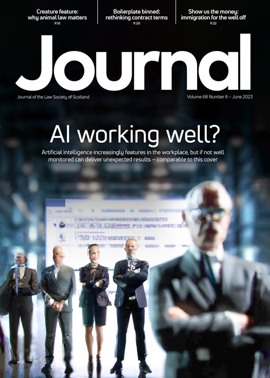Opinion: Jen Ang
What key questions lie at the intersection of tech, the law and social justice? How can digital solutions help to increase access to legal services for marginalised communities? What are the hidden barriers and risks?
These issues were recently discussed on a Digishift event hosted by SCVO and Third Sector Lab, featuring Aaliya Seyal, CEO of the Legal Services Agency; Danae Shell, CEO and co-founder of Valla; and me, director of JustRight Scotland and our digital learning social enterprise, JRS Knowhow.
The Covid-19 pandemic posed both a challenge and an opportunity for law centres like the Legal Services Agency to digitise their working practices, and also embrace tech as a tool for reaching clients. The pressing need to continue to deliver legal services to disadvantaged communities – isolated by the pandemic and even harder hit by discrimination and poverty – meant this transformation had to be tackled rapidly. But adopting new approaches also always comes with a raft of questions. Are we still reaching the right people? Have we chosen the right tools? Who are we leaving out, and how can we address those gaps?
Three different approaches to leveraging digital tech for social good, explored at the event, show its potential.
Amnesty Scotland’s free online guide, Your Right to Protest in Scotland, was written and produced by JRS Knowhow, ahead of the COP26 Conference held in Glasgow. These charities knew that Scotland would be hosting tens of thousands of delegates, journalists and climate justice activists, as well as thousands of police officers from across the UK, and that arrests were likely. But there were no clear, accessible resources on the right to protest in Scotland. The online guide explains Scots law through FAQs (frequently asked questions) in simple terms, also focusing on rights information for specific groups more likely to suffer increased discrimination or disadvantage – like children, migrants, visitors, and disabled people.
The Scottish Women’s Rights Centre’s FollowIt App mobile app was designed with media co-op, a design agency, to help victim-survivors of stalking record what is happening to them. The FollowIt App aims to keep women safer and also increase chances of a successful prosecution for the crime of stalking under Scots law by helping to capture real-time evidence of stalking behaviour, using geo-location, time-stamping, and text, audio and video inputs. The app is free to access for women over 18 in Scotland, and also supports victim-survivors to contact support agencies for further information and advocacy support.
Valla’s online platform is designed to empower employees to stand up to employers and get justice – and can be used to raise a complaint, settle with employers or even prepare for an employment tribunal. The app supports users to document key events, digitise and organise evidence, and even to generate appeal letters, witness statements and the ET1 particulars of claim. The app offers a tiered payment structure, with core features available free of charge, and a pay-as-you-go scheme for additional features, including the option of personalised coaching and feedback on preparing for tribunal or settlement.
Key learnings that we shared include:
- Legal advice and information can be complex, and the law is rapidly evolving. Risks arise when an explanation of the law is oversimplified, and also when legal resources become outdated. The cost of updating materials must be taken into account at the outset, as well as clear agreement on who bears responsibility for doing so.
- Tech solutions to accessing justice will work well for some audiences – and not at all for other people, or for entire communities. This is not a reason for charities to stop exploring the uses of tech, but it is important to recognise that tech will only ever be a partial solution, and will work best alongside alternative pathways for accessing legal advice, either in person or with additional support.
- Generative AI, like Chat GPT, is set to transform legal services and how people access information about their rights. AI could be part of a solution that empowers people and communities, and increases access to justice – but this solution is no more than the sum of its parts. And at its worst, new tech can replicate and amplify existing inequality and discrimination.
It is crucial, therefore, that legal experts and social justice-minded people stay in the mix and engaged with new developments in tech – to bring a constructive and critical perspective that aims to head off those pitfalls, and help us all capitalise on the promise of tech as a driver for social good.
Jen Ang, director, JustRight Scotland and JRS Knowhow
Perspectives
Features
Briefings
- Criminal court: Dangerous or careless?
- Corporate: Bill gives CMA consumer enforcement powers
- Agriculture: A question for the Land Court?
- Intellectual property: Who owns AI generated copyright?
- Succession: Variation by an attorney?
- Sport: Participation in LIV Golf ruled out of bounds
- Scottish Solicitors' Discipline Tribunal: June 2023
- Data protection: Meta's mega matter
- In-house: Scanning wider horizons







